Burkina Faso’s security, economic, and humanitarian conditions continue to deteriorate under the military junta despite a high-volume information campaign.
Since seizing power in a military coup in September 2022, Burkina Faso’s ruling junta under Captain Ibrahim Traoré has prioritized controlling the narrative of this Sahelian country of 23 million people. With the aid of a cadre of online influencers, intelligence-linked operatives, and affiliated media pages—the Traoré junta has extolled his reported achievements as a transformative leader paralleling the iconic Thomas Sankara.
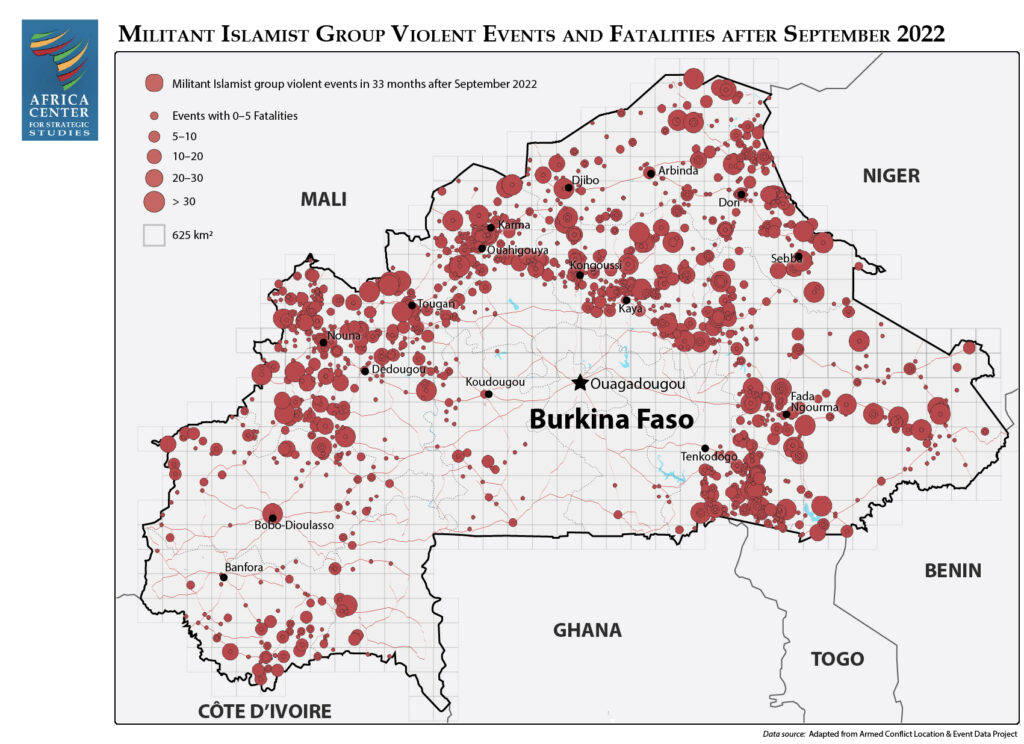
With support from Russian advisors, these claims are orchestrated by Traore’s two brothers, who lead the junta’s portfolios over the digital economy and communications. These campaigns have cast the military junta as successfully reclaiming territory from militant Islamist insurgents, championing economic innovation, and protecting Burkinabe civilians. Infused with anti-Western and anti-Economic Community of West African States (ECOWAS) themes, the campaigns seek to celebrate military rule, undercut the popular commitment to democratic principles, and project Russia as a trusted partner in Africa’s future.
In the past year, these claims have intensified in scale and scope, extending beyond Burkina Faso to target audiences in West Africa and the African diaspora globally.In the past year, these claims have intensified in scale and scope, extending beyond Burkina Faso to target audiences in West Africa and the African diaspora globally. According to these narratives, Traoré has received endorsements from a wide array of global personalities including Beyoncé, Rihanna, and Pope Leo XIV. Widely disseminated through artificial intelligence-generated videos, fabricated endorsements, and highly coordinated social media amplification, the campaigns have been instrumental in cultivating a digitally manufactured image of success reaching millions of viewers.
Given the frequency and breadth of these claims and the profound security and governance implications for the region, a closer examination of the unfolding realities in Burkina Faso is warranted.
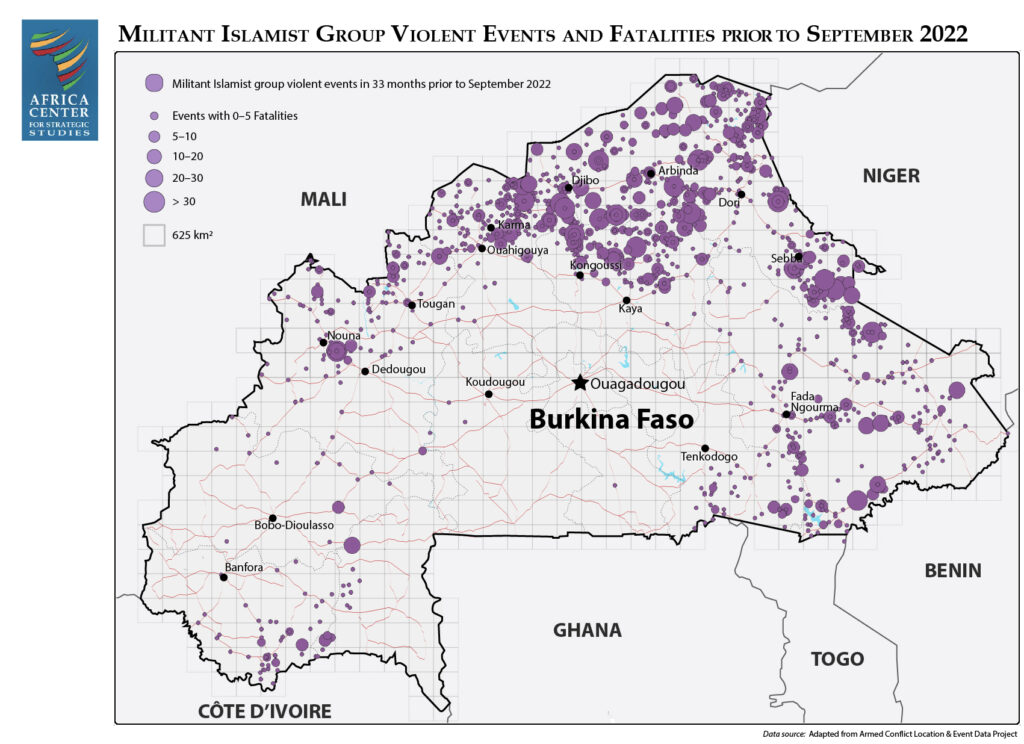
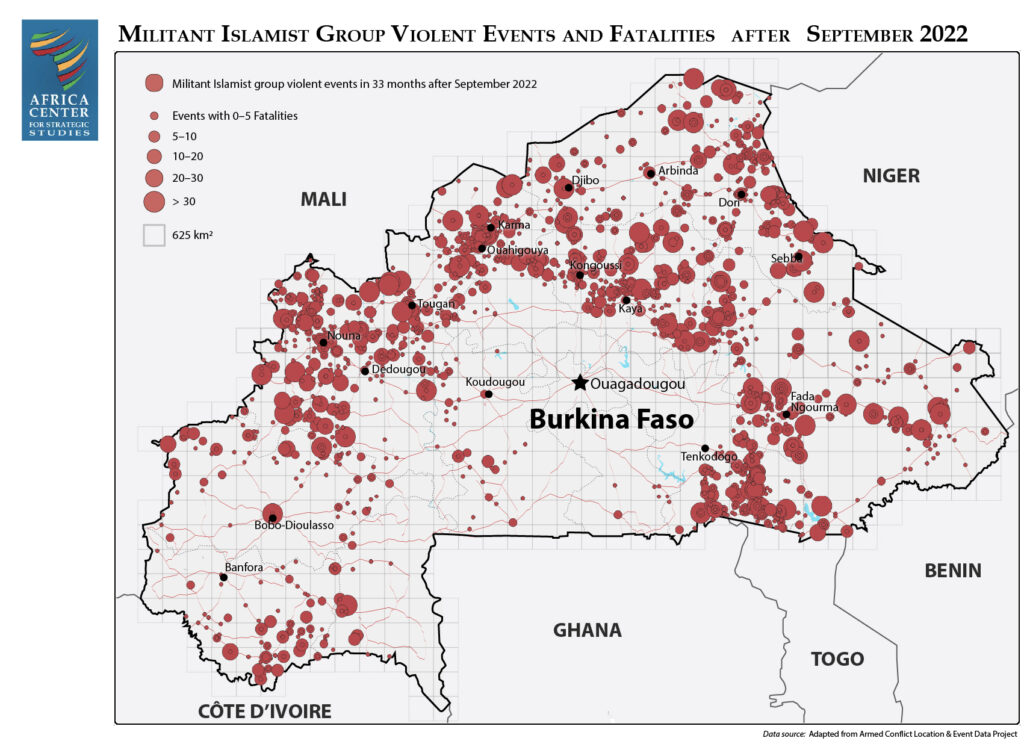
Highlights
Security
Since Traoré seized power at the end of September 2022, insecurity in Burkina Faso has, in fact, grown more deadly and widespread. Fatalities linked to militant Islamist group violence have almost tripled in the past 3 years, reaching 17,775 deaths. This compares to 6,630 deaths in the 3-year period prior to Traoré’s coup.
Violence against civilians at the hands of militant Islamist groups has increased under junta rule. Since Traoré’s military coup, militant Islamist groups are responsible for the fatalities of at least 2,823 civilians, marking an 87-percent increase from the 1,511 civilians killed over the same period before Traoré’s coup.
These statistics of deteriorating security are likely higher given that the junta has actively tried to suppress independent media reporting.
The lethality of these militant Islamist attacks appears to be accelerating. Three out of the five deadliest militant Islamist attacks in Burkina Faso since the onset of this violence in 2016 have taken place within the last year. These include an ambush on a military convoy near Nassougou killing 158, an attack on the city of Djibo including its military barracks killing at least 210, and an attack on the town of Barsalogho killing at least 310 mostly civilians.
The Burkina Faso military is often on the defensive in these attacks with militant Islamist groups over the past year instigating four times as many battles against Burkinabe forces than vice versa. In 2025, militant Islamists have mounted major attacks on military barracks in Di, Diapaga, Djibo, Foutouri, Lanfiera, Solenzo, Sollé, Thiou, Yamba.
During the first half of 2025, militant Islamist groups (primarily the Maçina Liberation Front, Ansaroul Islam, and Katiba Hanifa) have launched at least 42 attacks in which 10 or more soldiers were killed. Eight out of the 10 deadliest militant Islamist attacks against the military have taken place since Traore’s coup d’état.
These statistics of deteriorating security are likely higher given that the junta has actively tried to suppress independent media reporting, on which much of this data relies.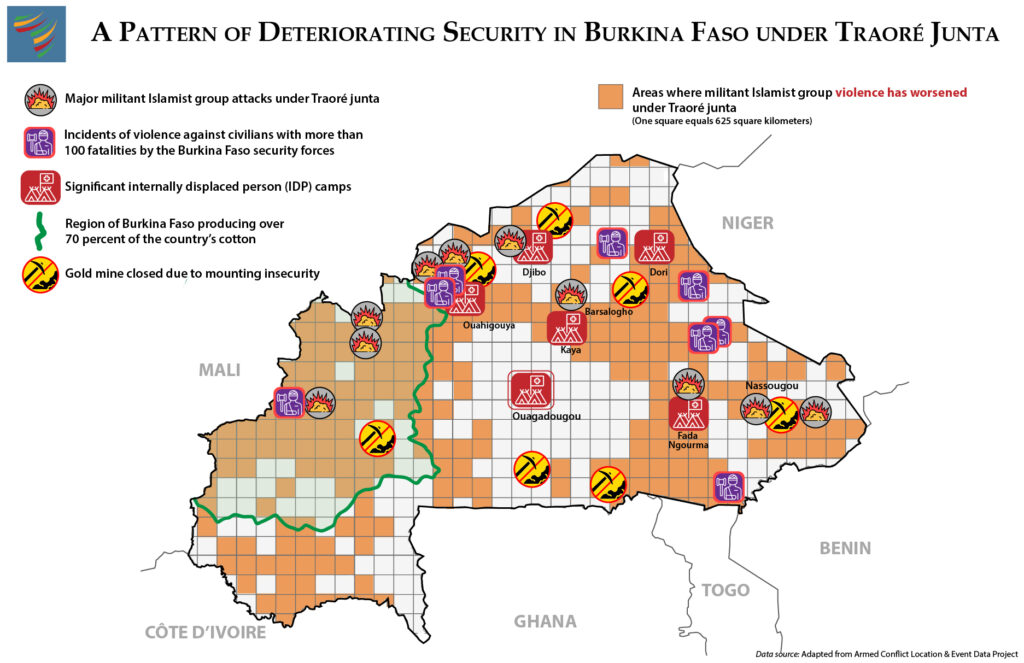
Burkinabe security forces are also linked to a spike in violence against civilians under Traoré. Security forces, including allied self-defense militias, are allegedly responsible for the fatalities of 2,121 civilians since the junta came to power. This represents a 132-percent increase from the pre-coup period.
Estimates are that Burkinabe military forces continue to lose control of territory and now operate freely in as little as 30 percent of the country, leaving the remaining 70 percent contested. This compares to around half under government control in 2022. Using siege tactics, militant Islamist groups have encircled roughly 130 Burkinabe towns and cities and cut off major arteries between Ouagadougou and Togo, Benin, Niger, Mali, and Côte d’Ivoire.
More communities are also experiencing militant Islamist violence than they did in 2022. An estimated 165,000 square kilometers of territory have seen more violence since Traoré took power than in the 3 years prior to the September coup. This reflects an intensification of militant Islamist presence in northern Burkina Faso and an expansion westward and southward toward the borders of the coastal West African countries of Benin, Togo, and Côte d’Ivoire.Economy
Gold accounts for roughly 70 percent of Burkina Faso export earnings. With production of 66.9 tons, valued at $7.18 billion, gold accounted for an estimated 16 percent of Burkina Faso’s gross domestic product in 2023. Since then, gold production has declined dramatically owing to growing insecurity, which has led to the closure of 7 out of the country’s 17 industrial mines (Inata, Taparko, Karma, Boungou, Youga, Nétiana, Yaramoko). The junta has also nationalized five mines. Industrial gold production has subsequently dropped by 20 percent to 53.4 tons. The economic impacts from this would be greater were it not for the global spike in gold prices in recent years.
[Over the past year], militant Islamist groups have instigated four times as many battles against Burkinabe forces than vice versa.
Cotton production, historically Burkina Faso’s preeminent agricultural export, has similarly plummeted since the junta came to power, registering the lowest outputs in the last decade. Insecurity has rendered many cotton fields inaccessible and led to the massive displacement of farmers from the primary cotton producing region in western Burkina Faso.
Foreign direct investment inflows into Burkina Faso have fallen precipitously since the military coup, dropping from $670 million recorded in 2022 to $83 million in 2024.
The country’s ranking on Transparency International’s Corruption Perception Index has declined from 77 (out of 180 countries) in 2022 to 82 in 2024.Population Displacement and Living Conditions
The junta has not updated the number of internally displaced people since March 2023, when the official tally was just over 2 million people. Diplomats and humanitarian officials estimate that the total number of people displaced could be between 3 to 5 million. Moreover, there are regular reports of Burkinabe refugees flocking to Senegal, Ghana, and Côte d’Ivoire.
Even according to official figures, a total of 229,515 people representing 36,826 households, have been displaced in the first 5 months of 2025. This represents a 92-percent increase compared to the same period in 2024.
A reported 5,319 schools have been closed due to insecurity, leaving nearly 2 million children without access. More than 3.2 million children need humanitarian assistance.
The worsening security situation has resulted in the closure of 424 health facilities and an additional 309 operating at minimal capacity, depriving 4 million people of access to health care by the end of 2024. This is more than double the number of health facilities closed (195) at the end of 2022.
Since the beginning of 2025, Burkina Faso has faced multiple concurrent public health epidemics, including measles, polio, hepatitis E, and yellow fever. UNICEF reports that 2,168 cases of measles have been documented nationwide through the first 5 months of 2025, nearly the same amount as the total of 2,190 cases recorded in all of 2023.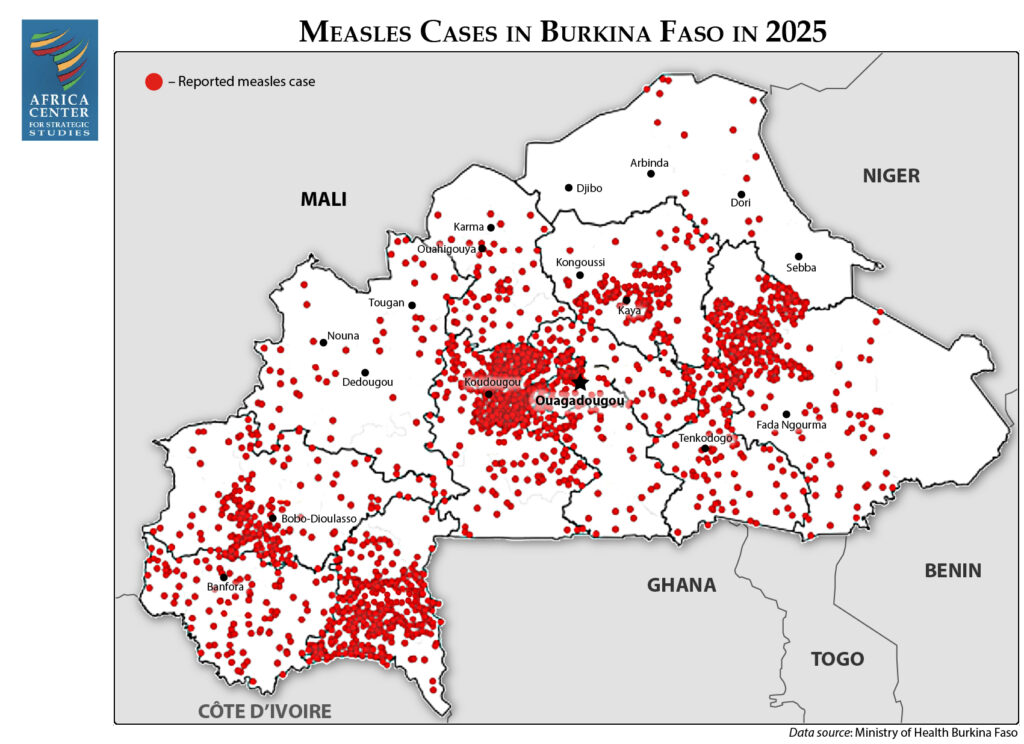
A Widening Disparity between Narratives and Events on the Ground
The data show that since Traoré’s coup in September 2022, Burkina Faso has suffered under a steady deterioration in the country’s security, economic, and living conditions. This underscores a growing disparity between the empirical reality and narratives promoted by the junta and its supporters.
As these trajectories widen, it is likely that the junta’s reliance on narrative control will deepen. This partly explains why the military junta has so aggressively attempted to silence independent reporting and marginalize credible local and international voices. Jurists, journalists, and civil society actors who attempt to draw attention to the deteriorating conditions are systematically detained and deployed to the front lines in the battle against militant Islamist insurgents.
It is likely that the junta’s reliance on narrative control will deepen.The volume and sophistication of these misleading campaigns reflect a broader pattern of foreign-sponsored information interference in Africa. Russian actors have played a leading role in seeding and amplifying false narratives around Burkina Faso’s military junta. The junta, in turn, has been among the most vocal supporters of Moscow’s growing security presence in Africa. Russia’s influence in the information sphere builds on years of investment in covert media operations and influence networks in the Sahel that have aimed to appear local and credible. Russian-linked operatives and front organizations—often operating under the guise of pan-Africanist or anti-imperialist movements—have steadily built their presence in Burkina Faso’s information ecosystem and regionally.
Addressing security challenges in Burkina Faso and the region will require navigating the disparities between these narratives and the security realities on the ground.
